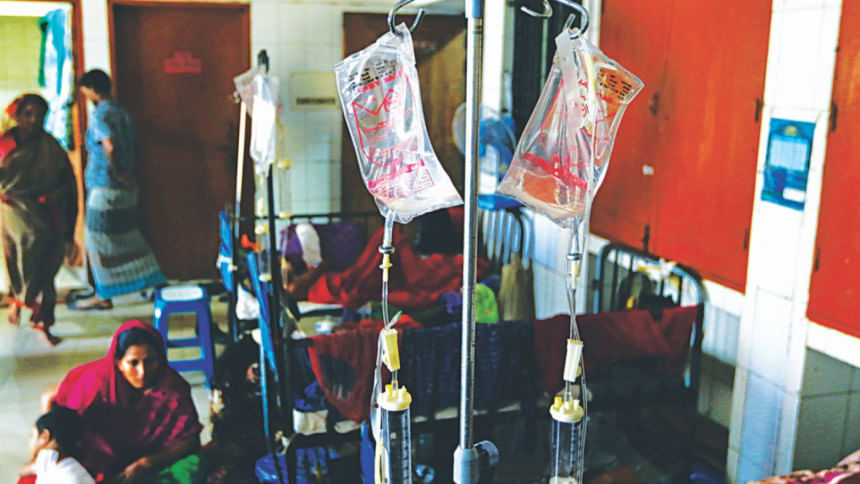Govt hospitals run short of free saline

Government hospitals across the country are facing a serious shortage of some key medical supplies -- saline, infusion and transfusion sets, and blood bags -- as their production at the state-run IPH remained suspended for about a year.
The Institute of Public Health (IPH) resumed production on June 5 on a limited scale, but hospitals are still scrambling for the supplies and patients are being forced to buy those from outside, which they are supposed to get for free.
An IPH official said that in 2016-17, the IPH manufactured 10,000-12,000 IV saline bags per day. Between July 5 and July 16, it came down to just 3,033 a day, which is too little for too many patients across the country.
There are 610 government hospitals across the country with around 49,000 beds for patients, according to health ministry data.
“The IPH has failed to meet our demand and we've no choice but to buy saline from elsewhere. In other cases, patients buy their own saline,” said Palash Roy, resident medical officer of Moulvibazar District Sadar Hospital.
So far this year, they got a little over half of their demand, he added.
FOR THE BENEFIT OF PVT COMPANIES?
The current crisis came to light on July 1, when the Anti-Corruption Commission raided the office of the IPH at Mohakhali in the capital.
The ACC conducted the raid based on a tip-off on its hotline (106) that the IPH suspended production on purpose to give private companies a chance to profit.
Interestingly, production resumed almost immediately after the drive, coordinated by ACC Director General Muhammad Munir Chowdhury.
ACC's findings were not immediately available, but sources said that IPH officials admitted to the ACC that production had remained suspended for a year.
The very next day, the IPH ran an advertisement where it said that the transfer of five directors between May 30, 2017 and April 26, 2018, delayed the purchase of the required raw materials. The current stock was also finished.
In the advertisement, however, it said production had stopped six months ago, and not a year ago as they told the ACC team.
“After assuming the charge of director of IPH [on April 24, 2018], he [Abul Kalam Md Azad] has taken various initiatives to keep the production of saline stable. As a result, the stock of raw materials has increased. And within the next seven days, the production of various saline will return to normalcy,” reads the advertisement.
Asked about the allegations of foul-play, Azad remained tight-lipped and asked to go through the advertisement instead.
Speaking to The Daily Star by phone yesterday, Director General of the Directorate General of Health Services Abul Kalam Azad provided another timeframe.
"The production at IPH was halted for about one month due to complexities in buying raw materials," he claimed.
He also added that IPH alone could not meet the total demand for saline and that was why hospitals had to buy these from private companies.
IPH documents show that before June 30, it had a stock of 1,198 single blood bags. Between, July 1, 2018 and July 17, 2018, it produced only 2,205 single blood bags and supplied all of them.
There was also no stock of double, triple, quadruple and baby blood bags. About 3,900 transfusion sets were in stock on June 30 but all of them had been supplied.
The IPH did not manufacture any more of these and the production of infusion sets also stopped.
Between July 5 and July 16, the IPH manufactured only 7,000 pieces of glucose saline, 3,650 glucose aqueous, 7,700 normal saline, 5,030 cholera saline, 7,010 Hartmann's solution and 6,000 baby saline.
The production of peritoneal dialysis (PD) fluid, hemodialysis and 3% sodium chloride, used during dialysis, during this period was zero.
PATIENTS BEARING THE BRUNT
Ibrahim Ahmed was admitted to the gastroenterology department of Mugda General Hospital in the capital with severe abdomen pain on Thursday. The on-duty doctor administrated intravenous glucose saline to improve his weak health condition.
The saline was supposed to be provided by the hospital free of cost, but Ibrahim's relatives were asked to buy the saline of a private company.
Unaware of the fact that they were entitled to get free saline, Ibrahim's mother Amena Begum bought it from a pharmacy adjacent to the hospital. “I had no option but to rush to the pharmacy to buy the saline and infusion sets,” she said.
The crisis is affecting many other patients.
Chandu Sheikh was admitted to Rangpur Medical College Hospital (RMCH) with a stomach disorder on July 14 and needed saline as he was dehydrated.
But the hospital could not provide him with it. Chandu said he had spent Tk 667 on saline and other medications.
The extent of the crisis was clear during our visits to over half a dozen government hospitals.
Ajay Ray, director of Rajshahi Medical College Hospital, said they were getting supply of saline bags lesser than their daily demand. The hospital authorities were in touch with government high officials over the crisis and they were expecting an improvement in supply soon.
A similar situation was seen at M Abdur Rahim Medical College Hospital in Dinajpur, Pabna General Hospital, Pirojpur Sadar Hospital, Tangail General Hospital and Moulvibazar District Sadar Hospital.
Due to IPH's suspension of production, doctors in some hospitals suggested the patients buy saline from local pharmacies while in some hospitals saline was procured from private companies.
Mugda General Hospital's director Faruk Ahmed Bhuiyan said there was a supply shortfall. “But we're not dependent on the IPH only. We also buy saline from private companies and provide those to the patients for free,” he said.
Replying to a question, Faruk said sometimes doctors prescribed saline of private companies thinking those would be better. “In such cases, there is little scope to interfere. However, there is a common guideline given to doctors to administer free medicine to patients.”
Apart from saline, there is also a dearth in blood bags in government hospitals around the country.
At Dhaka Medical College Hospital, this correspondent saw patients buying blood bags from pharmacies outside the hospital.
“Since the supply has stopped, we ask patients to buy blood bags from outside,” said Shahjahan, a staff member at the DMCH Blood Bank.
[Our Dinajpur, Moulvibazar, Pirojpur, Pabna and Tangail correspondents contributed to the report.]

 For all latest news, follow The Daily Star's Google News channel.
For all latest news, follow The Daily Star's Google News channel. 







Comments